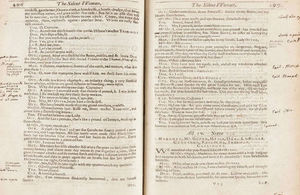Rare Ben Jonson book at risk of leaving the UK
Arts minister steps in to prevent volume of works from export.

A rare annotated copy of the Silent Woman, by Ben Jonson.
Arts Minister John Glen has placed a temporary export bar on a rare book with unique annotations to provide an opportunity to keep it in the country.
Workes, an annotated collection of writings by Ben Jonson, is at risk of being exported from the UK unless a buyer can be found to match the asking price of £48,000.
Ben Jonson (1572-1637) is hailed as the most important writer of the English Renaissance after Shakespeare, having lived and worked in an age of great social change that produced some of the finest works of English literature.
This extraordinarily rare volume is the only known example of a document showing how a play by Ben Jonson was prepared for performance. Material that tells us about the performance of pre-Restoration plays is extremely scarce.
This volume occupies a unique place among surviving materials because of the nature and range of its annotations to Epicoene, or The Silent Woman – including stage directions, details of props, and textual corrections – which collectively do not fall into any category previously known to scholars of seventeenth-century theatre. The volume is therefore of outstanding interest to the study of English theatrical history.
A product of a period when plays were seen not as finished pieces, but as perpetual works in progress, this volume has the potential to change scholars’ understanding of how plays were transmitted from the page to the stage and back again.
Arts Minister John Glen said:
This fascinating book shows how Ben Jonson’s works evolved and were translated to the stage.
I hope that we can keep it in the UK to enrich the study of English theatrical history and learn more about the performances of his work.
The decision to defer the export licence follows a recommendation by the Reviewing Committee on the Export of Works of Art and Objects of Cultural Interest (RCEWA), administered by The Arts Council.
RCEWA member Peter Barber said:
The annotations in this volume shed uniquely detailed light on how one of the hit comedies of the seventeenth century might actually have been performed.
Samuel Pepys thought The Silent Woman ‘the best comedy that ever was wrote’ and this book enables us to go the theatre with him. It must remain in this country.
The RCEWA made its recommendation on the grounds of the annotated volume’s outstanding significance for the study of English theatre in the seventeenth century and, in particular, for the study of Ben Jonson’s plays in performance.
The decision on the export licence application for the book will be deferred until 5 February 2018. This may be extended until 5 May 2018 if a serious intention to raise funds to purchase it is made at the recommended price of £48,000.
Organisations or individuals interested in purchasing the book should contact the RCEWA on 0845 300 6200.
A photo of the book can be downloaded via our flickr site.
ENDS
For media information contact: Yasmin Kaye Senior Communications Officer Department for Digital, Culture Media and Sport Tel: 0207 211 6489 Email: yasmin.kaye@culture.gov.uk
Notes to editors
- Details of the book are as follows: A second edition of volume 1 of Ben Jonson, The Workes of Benjamin Jonson (first published c1620; this edition 1640, published in London by Richard Bishop to be sold by Andrew Crooke). The volume has been rebound in plain sprinkled calf, probably around 1900. It measures (cm) 30 x 19 x 6. There are some small tears, repairs, and staining, but the book is generally in good condition.
- The Reviewing Committee on the Export of Works of Art and Objects of Cultural Interest is an independent body, serviced by The Arts Council, which advises the Secretary of State for Digital, Culture, Media and Sport on whether a cultural object, intended for export, is of national importance under specified criteria.
- The Arts Council champions, develops and invests in artistic and cultural experiences that enrich people’s lives. It supports a range of activities across the arts, museums and libraries – from theatre to digital art, reading to dance, music to literature, and crafts to collections. www.artscouncil.org.uk.